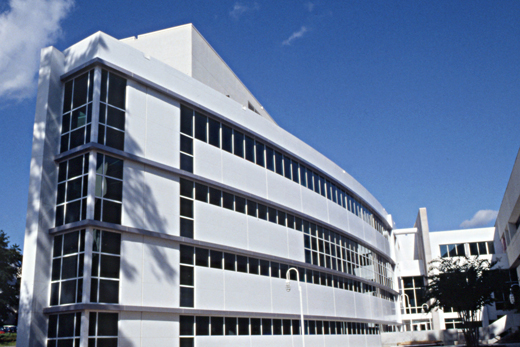Three projects intended to expand solar power on the Emory campus have been selected by Georgia Power for participation in its Advanced Solar Initiative (ASI).
Working with Atlanta-based solar developer Inman Solar, Inc., the Georgia Power initiative will allow for the installation of a series of low-profile, roof-mounted solar panels in three locations: atop the Emory University School of Law; the Hugh F. MacMillan Law Library; and Emory's North Decatur Building.
"Bringing renewable energy to Emory is an important step toward fulfilling Emory's sustainability vision and Climate Action Plan," says Ciannat Howett, director of sustainability initiatives for Emory's Office of Sustainability.
Together, the three sites — considered small scale projects under the ASI — will have the capacity to produce about 295.5 kilowatts (kW), a rating of the systems' direct current (DC) output power, according to Brent Zern, assistant director of operational compliance and maintenance programs for Emory Campus Services.
"Emory's benefit is that with any clean energy project comes a renewable energy credit," Zern says. "That means the University will get exclusive rights to that renewable energy credit, since the power is being generated right here on campus. Power generated in a clean way creates minimal emissions and can be used to offset other carbon emissions created from less clean sources."
"We're also reducing our carbon footprint and helping to achieve our goals under Emory's Climate Action Plan, so we're moving in the right direction," he adds.
Approved by the Georgia Public Service Commission in November 2012, the Georgia Power Advanced Solar Initiative (GPASI) is a solar energy purchase program primarily designed to spur growth within the solar community in Georgia.
Under the program, Georgia Power allows entities, such as Emory, to partner with a developer to produce renewable solar energy. "We could agree to have the contract directly with Georgia Power, but then we would have had to fund the design, installation and operation of the solar system," Zern explains. "Instead, we're going through a solar developer (Inman Solar), who contracts directly with Georgia Power and will own and operate the systems."
In turn, Georgia Power will pay Inman Solar a premium for the power produced on the Emory campus, then resell it to their customers.
"That's how the developer will recoup their money for installing and operating the system," Zern notes.
Expanding solar power at Emory
Emory's solar projects were among a number of proposals submitted under the Georgia Power initiative this spring. Because of the number of applications, awards were selected solely through a lottery system, Zern says.
The new developments, projected to be completed within six months, will mark a significant expansion of the University's solar presence on campus, according to Zern.
Currently, the University operates a small solar demonstration unit at Few and Evans residential halls — six panels that power a pump that helps bring reclaimed storm water back into the building for use as toilet flush water, Zern says.
"This really is groundbreaking in that it helps us get a significant amount of solar energy on campus that was previously unavailable to us," he says.
In December, Emory was named the nation's top "Higher Education Institution" by the U.S. Green Building Council's Center for Green Schools in its annual "Best of Green Schools 2013" report.
The designation recognizes educational institutions and individuals across the country that demonstrate innovative approaches to school sustainability, environmental initiatives and a commitment to Leadership in Energy and Environmental Design (LEED).

